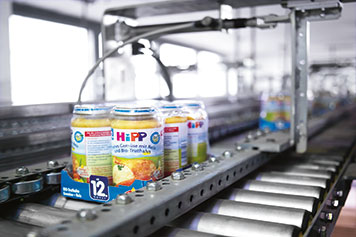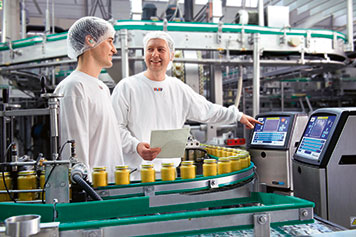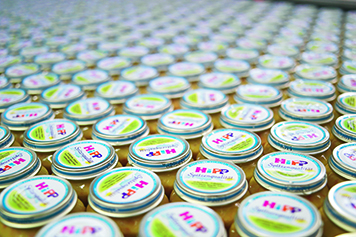HIPP - production of baby food with SAP MES | IGZ as implementation partner
To produce top-quality in harmony with nature, under the premise of the family-owned company, since its inception in 1899 HiPP has evolved to a pan-European medium-sized foodstuff manufacturer in the fields of baby and infant foods, as well as in health and care. From our headquarters in Pfaffenhofen, HiPP operates production facilities in Germany, Austria and Switzerland as well as in Russia, Ukraine, Hungary and Croatia. With over 60 years of experience in organic farming, some 3,000 employees generate an annual turnover of Euro 850 million (2015).
Administrative efforts and isolated solutions

With the growth of the company, both in-house quality requirements as well as those of the customer increased in relation to product reliability and traceability Continuously new requirements of the legislator in different target markets and the associated documentation obligations resulted a high administrative burden, so that the pressure to act for IT-supported manufacturing gradually increased. Many work processes based on hand-written documentation, which had to be additionally updated by employees in the respective systems. These are specifically order and control documents, incurred in each production step and data that employees had to enter manually in SAP ERP or several stand-alone systems.
Moreover, there was no consistent platform for process optimisations at the shop-floor level. Each production site operated self-procured proprietary solutions adapted to the respective systems, for example, to obtain performance data or to control the supply of components for finished products. "The complicated on one hand the connection of the individual sites to SAP ERP because we had to repeatedly develop new interfaces, and on the other hand the IT support because proprietary black box solutions in the context of improvement initiatives are difficult to optimise", recalls Donal Doyle, head of IT at HiPP. It was clear to him, his team and subsequently also the production managers that a solution common for all sites had to be found, with which manufacturing processes can be standardised throughout the group.
System-guided production rather than production "with paper".

Thus, the IT department emerged as a key driver for a complete group solution, to implement the vertical integration of different levels of the company ranging from the sales down to the shop floor. "More local initiatives and stand-alone solutions would have not helped us", says Doyle. Therefore, HiPP decided to introduce an MES solution. The goal: the paperless manufacturing through a system-run production. This eliminates administrative activities, such as printing and distribution of documents as well as data transmissions, resulting in significant time savings. And there are further advantages: By means of a computer-aided collection of quality and production data, product safety increases, also with respect to the traceability and process locking that are important to HiPP. Current information from manufacturing, as well as continuous flow of information on the spot also ensure enhanced process flow. And lastly, HiPP seeks cost savings by using templates that shall find apply in all plants.
Since SAP ERP was already in use cross-works, the decision was made in favour of SAP MII after evaluation of various alternatives in order to link the production and business level in real time and group-wide. One of the main reasons for choosing SAP MII: HiPP may accumulate internal and central know-how for the development of in-house applications. Any additions for a non-SAP solution are possible only through the respective developer. The expertise necessary for this would be available only locally as in the previously used black box solutions. In addition, by accumulating internal know-how, also the dependency of the company on external service providers will also be reduced gradually - a cost factor not to be ignored.
High project acceptance through fair decentralised cost distribution.

The works in the Croatian Glina was selected as a pilot project. At this site, HiPP produces bio baby food and processes cereals and dried products for this purpose. The careful selection of raw materials, as well as the quality assurance throughout the entire production process are key factors for the company to provide high product quality. As implementation partner, HiPP chose the SAP project house IGZ from Falkenberg, which specialises in production and logistics. "We have noticed pretty quickly that we are on the same wavelength with the IGZ professionals", says IT CEO Doyle. "Of course, the know-how and the experience in the implementation of MES projects have convinced us."
To integrate the SAP MES solution at each site into the existing SAP ERP, Doyle and his team have together with the experts of IGZ developed the basic functions for a uniform group template, that includes an in-process control (IPC), a plant information catalogue (PIC) for system configurations or also SAP PP/PI control recipes, formulates the dialogues for processing of manufacturing instructions - so-called electronic work instruction or in short EMI dialogues. In addition to other core template features for the traceability of the manufacturing process and linking the technical shop floor components, however, also the possibility to configure site-specific MES behaviour was created.
Therefore, for instance work instructions or shift information can be updated even remotely and locally. This template is to be rolled out at all production sites. HiPP ensures that the financial burden does not lie only on the pilot project, by a central financing strategy of the template development. Instead, the costs between the Croatian works as pilots and the other production sites, which implemented the solution, are distributed through the introduction of SAP. "This approach was particularly important to achieve a high acceptance of our MES strategy across the group," explains Doyle.
First positive experiences
The first phase of the MES introduction at the pilot site in Croatia has now ended. The shop floor is connected via SAP MII in SAP ERP, weighing and picking processes proceed in a system-controlled manner. The site thus consolidates its leading position in Croatia with respect to documented quality standards in the foodstuff industry.
The résumé is consistently positive. Due to the fixed tender specifications for system providers that now need to adhere to the Weihenstephan standard, HiPP expects further reduction in the abundance of interface with technical systems. Also, the development of internal know-how has begun, so that the share of project equity services will increase in the future. "Also, the future IT resource requirements will depend on the production requirements and not on the MES solution", adds Doyle. "We have also selected the appropriate manpower in order to cope with the group-wide roll-out, also thanks to the professional project implementation of IGZ". For the remainder of the MES project, Doyle and his team look optimistically into the future.
Back to overview

